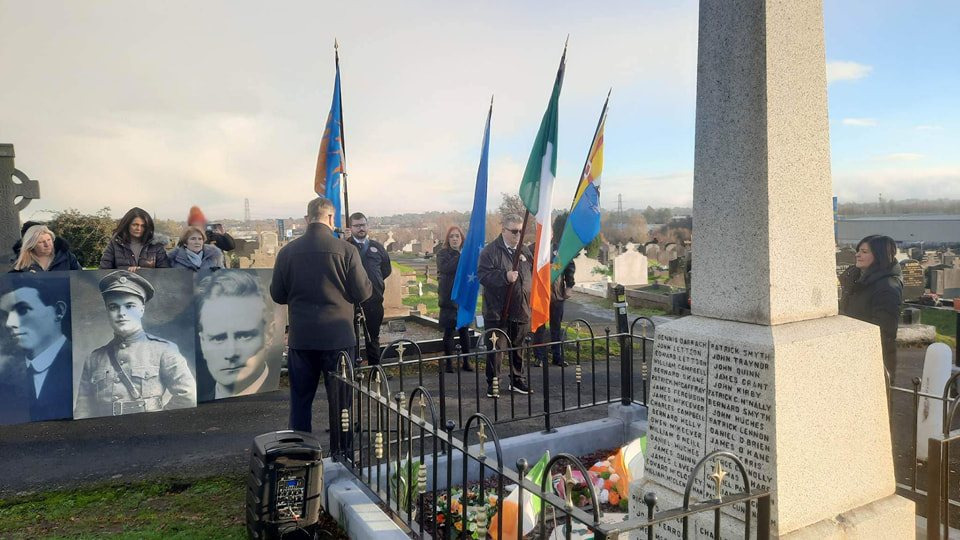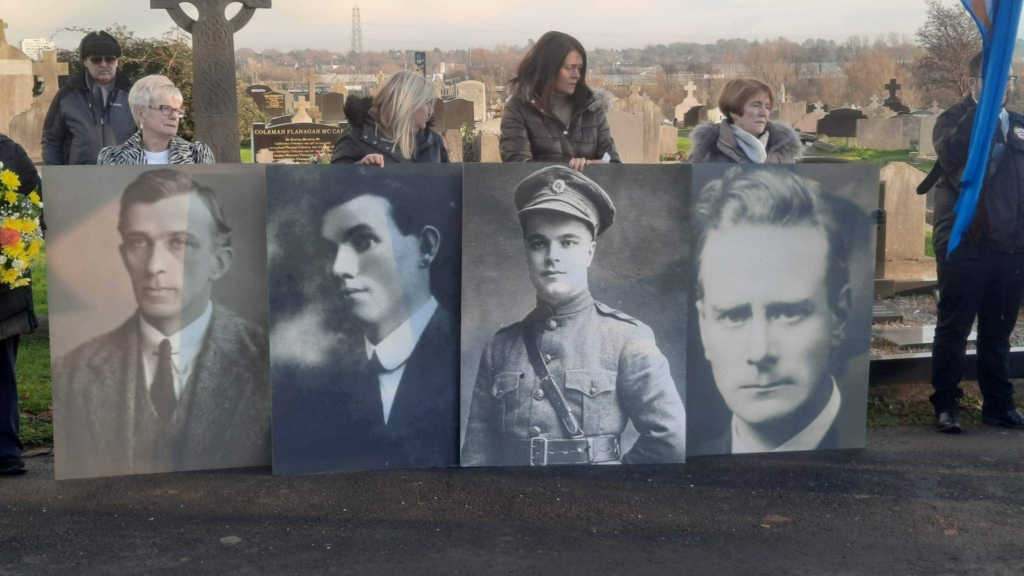
The Workers’ Party commemorated Liam Mellows, Rory O’Connor, Joe McKelvey and Richard Barrett today in Milltown Cemetery, one hundred years after their execution by the Free State.
Workers’ Party President Micky McCorry outlined our socialist republican vision for both the near and distant future:”We are now moving ever closer to the end of the two statelets on this island and towards national unity. This may not happen today or tomorrow but the days of the two backward states on this island are numbered.”
“We need to invest in an All Ireland NHS, in secular public education, in the provision of public housing for all of our people.”
“We emphasise the need for unity of the working class – we must build a republic that is true to the words and deeds of Theobald Wolfe Tone.”

Read the full speech below:
Comrades and Friends
Welcome to today’s commemoration for Joe McKelvey, Liam Mellows, Rory O’Connor, and Richard Barrett.
On the 8th December 1922, just over 100 years ago, these four men were executed by Free State Forces.
All four had fought in the war of independence against British forces and opposed the treaty sell-out.
On 14th April 1922, 200 Anti-Treaty rebels led by Rory O’Connor seized the Four Courts in Dublin. Their plan had been to encourage the British Army, still based in Dublin, to attack them and in so doing restart the war of independence and somehow heal the split within the republican movement.
Arthur Griffith, then President of Dáil Éireann, demanded swift action against the rebels in the Four Courts.
On 22 June 1922 a retired British Army Officer, Sir Henry Hughes Wilson, was assassinated by the IRA in London. The British placed the blame on Anti-Treaty forces in the Four Courts and Collins was told that if he did not dislodge them the British Army would. The rebels kidnapped Free State General JJ O’Connell and held him in the Four Courts. Collins then issued a final ultimatum, ordering the garrison to release O’Connell and surrender or he would attack his own countrymen.
On the 28th June 1922, Free State troops opened fire on the Four Courts, using artillery “loaned” to them by the British.
Among the 200 men in the Anti-Treaty garrison were 12 members of the Army Executive including O’Connor, Chief-of-Staff Joe McKelvey, and Quarter Master General Liam Mellows.
On the 29th, Free State troops stormed the east end of the building. By the next day, the Four Courts was on fire. Facing overwhelming odds, Ernie O’Malley, who had taken command of the garrison after the commander Paddy O’Brien was injured, surrendered the Four Courts to the Free State on 30th June.
Following the deaths of Collins and Griffith in August 1922, O’Higgins and Cosgrave became the most prominent figures in the cabinet. There began an era of horrific revenge killings by the Free State Government against Anti-Treaty republicans. Cosgrave and O’Higgins instigated martial law and authorised military courts.
On the evening of 7th December, in Mountjoy Gaol, Liam Mellows, Rory O’Connor, Joe McKelvey and Richard Barrett, received notice of their impending executions the following morning. They were to be executed in an act of cold blooded revenge for the killing of the pro-Treaty TD Sean Hales, a killing that none of them had any connection to.
This sadly was neither the beginning nor the end of the murder of republicans by the Free State Government.
It was part of a bloody campaign of murder, brutalisation, and torture of Republicans carried out by the Free State.
They would execute a total of 81 Republican prisoners as part of this campaign.
In Kerry, the Dublin Guard committed numerous atrocities, most notably at Ballyseedy, where they tied Republican prisoners to landmines and blew them up. In Dublin Free State thugs kidnapped and murdered Fians Sean Cole and Alfred Colley in revenge for the death of Michael Collins.
These are but a small sample of the widespread campaign of killings and torture carried out.
But it was not only the Republican movement that the Free State forces targeted. The Special Infantry Corps was established to put down strikes and to target urban and rural workers, as well as small farmers in the period of widespread industrial and agrarian unrest that coincided with the start of the civil war.
This group of thugs burned labourers’ cottages, shot at and broke up pickets of striking workers, and intervened on behalf of both ranchers and British landlords to intimidate and threaten workers and small farmers.
Let us be clear – this campaign was to send a message to those who opposed the Free State or those who wished for a change of system that the Free State would be a safe pair of hands for the Irish elite and for British imperialism – that it would guarantee that the freedom to exploit continued unaffected in the new state.
Comrades, in particular today we remember Joe McKelvey – given his close connection to the Lower Falls – an area of Belfast that has had and will continue to have a proud tradition of true Republicanism.
Joe McKelvey was born in Stewartstown, Co. Tyrone, and moved to Cyprus Street in Belfast in 1914.
He joined the Republican Movement and helped to defend catholics during the ‘Belfast pogroms’ of July 1920. He was appointed commandant of the 3rd Northern Division of the IRA in 1921, and later appointed assistant chief of staff of the anti-treaty IRA. He was ultimately to be captured in the Four Courts and executed months later in cold blood, for a killing he had no connection with.
While we cannot be certain of McKelvey’s political ideology at the time of his death, it seems likely that he, along with his comrades Liam Mellows and Peadar O’Donnell, was part of a small group of Republican prisoners in 1922 who engaged with socialist ideas in the midst of the Free State counter revolution.
Mellows, in particular, in his writings from Mountjoy saw the true nature of the Free State as a ‘buffer state’ for capitalism; a state that would allow the Irish exploiting class and British imperialism to continue to profiteer at the expense of the great majority of the Irish people.
‘It is a fallacy, Mellows said, to believe that a Republic of any kind can be won through the shackled Free State. You can’t make a silk purse out of a sow’s ear. The Free State is British created and serves British Imperialist interests. It is the buffer erected between British Capitalism and the Irish Republic.’
100 years later, we can reflect on Mellows’ writings from Mountjoy. There is no doubt that the 26 county state continued to serve the interests of the big farmers, the landlords, and the British imperialists.
Indeed, the only thing that has changed since Mellows time is the nature of the imperialist exploitation of the 26 county state. It is now no longer the British Empire but the United States Empire that dominates. It controls the southern economy through its multinationals and pushes it ever closer to NATO and away from the longstanding position of neutrality.
Comrades, we live in times of major upheaval, both at home and abroad.
We are now moving ever closer to the end of the two statelets on this island and towards national unity. This may not happen today or tomorrow but the days of the two backward states on this island are numbered; and no amount of ranting and raving from so-called socialists will stop that process.
This is a process, then, that we must engage with – not out of romanticism or simplistic nationalism but because it is a major issue for the Irish working class.
For too long we have stood to one side on this issue – the voice of the Workers’ Party must be heard on the national question.
In that regard we were delighted to take part in the recent Ireland’s Future conference in Dublin to put forward our socialist and republican perspective on the process of unification.
We emphasised the need for unity of the working class – we must build a republic that is true to the words and deeds of Theobald Wolfe Tone.
We said that we need to invest in an All Ireland NHS, in secular public education, in the provision of public housing for all of our people.
We cannot simply glue the two statelets on this island together.
It is time for a new Republic.
Comrades, as James Connolly said, ‘Men perish but principles live’.
Many have paid lip service to the principles of Mellows and McKelvey over the decades but ultimately abandoned them, either to the comfortable embrace of the Irish gombeen class or that of the British state.
100 years on from their death we, the Workers’ Party of Ireland, remain true to their principles.
In rebuilding our Party as a party of the working class, and fighting for a new, socialist, and secular 32 county Irish Republic, we ensure that the principles of Liam Mellows, Joe McKelvey, Rory O’Connor, and Dick Barrett will live.
Liam Mellows, Commandant General, 25 May 1892 – 08 Dec 1922
Rory O’Connor, Commandant General, 28 Nov 1883 – 08 Dec 1922
Joe McKelvey, Commandant General, 17 June 1898 – 08 Dec 1922
Richard Barrett, Assistant Quartermaster General, 17 Dec 1889 – 08 Dec 1922
